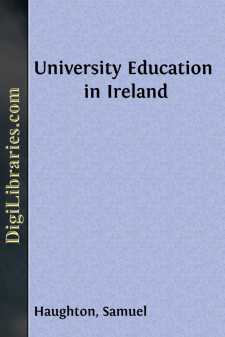Categories
- Antiques & Collectibles 13
- Architecture 36
- Art 48
- Bibles 22
- Biography & Autobiography 813
- Body, Mind & Spirit 142
- Business & Economics 28
- Children's Books 17
- Children's Fiction 14
- Computers 4
- Cooking 94
- Crafts & Hobbies 4
- Drama 346
- Education 46
- Family & Relationships 57
- Fiction 11829
- Games 19
- Gardening 17
- Health & Fitness 34
- History 1377
- House & Home 1
- Humor 147
- Juvenile Fiction 1873
- Juvenile Nonfiction 202
- Language Arts & Disciplines 88
- Law 16
- Literary Collections 686
- Literary Criticism 179
- Mathematics 13
- Medical 41
- Music 40
- Nature 179
- Non-Classifiable 1768
- Performing Arts 7
- Periodicals 1453
- Philosophy 64
- Photography 2
- Poetry 896
- Political Science 203
- Psychology 42
- Reference 154
- Religion 513
- Science 126
- Self-Help 84
- Social Science 81
- Sports & Recreation 34
- Study Aids 3
- Technology & Engineering 59
- Transportation 23
- Travel 463
- True Crime 29
University Education in Ireland
by: Samuel Haughton
Description:
Excerpt
INTRODUCTION.
The political condition of Ireland is, at present, grave; and, in the event of a war with the United States, would become menacing, to England.
Irish politicians assert—and it is partly admitted by their opponents—that, in the existing state of Ireland, three questions demand an immediate solution: these questions are, the Land Question, the Church Question, and the Education Question.
The tenant farmers of Ireland wish for fixity of tenure, and care but little for compensation for improvements, except as a means of obtaining a practical fixity of tenure; and they would, unquestionably, rejoice to see transferred to themselves, as occupiers of the soil, the rights now enjoyed by absentee noblemen and landlords. It is the opinion of many that the Land question cannot be settled without such a change of owners as would practically amount to a revolution.
With respect to the question of the Church, the more intelligent laymen of the Irish National party openly avow their wish to alienate the property of the Church, on the ground that its existence forms a barrier to the union of Irish Protestants with the Catholic majority in the formation of a truly National Irish party. It is asserted, and apparently not without reason, that if the Irish Protestants felt themselves cast off by England, and their Church endowments confiscated, they might become more willing to join their countrymen in an anti-English policy, which the rude breath of war might some day fan into a demand for an Irish Republic, under the guarantee of France and America. It is for English politicians to decide how far the advantages of religious equality would compensate for the risk of national disloyalty.
The questions of the Land and Church in Ireland will, doubtless, be fully discussed in the House of Commons by persons acquainted with those questions, and competent to do them justice; but it may be fairly doubted whether the question of Education in Ireland will be examined with as full a knowledge as will be brought to bear on the other questions. The following lines are written in the hope of adding a contribution of facts towards the discussion of one branch of the Education question—that which relates to University Education in Ireland.
My apology for writing on this question is, that I have been a Fellow of Trinity College for nearly a quarter of a century, during which time I have taken an active part in the educational reforms which have placed the Graduates of Trinity College foremost in all the competitions for the public services of India, of the Army, and of the Colonies. I am also entitled to be heard as a Clerical Fellow of Trinity College, holding in trust for his brother Protestants the precious gift of education based on pure religion, handed down to us by our forefathers, in defence of which all true Protestants are prepared, if necessary, to sacrifice their lives.
Two proposals were discussed, and a third was incidentally alluded to, in the summer of 1867, in the House of Commons, respecting University Education in Ireland; one of these proposals involves a betrayal of the religious base on which the Protestant College of Elizabeth was founded; and another involves a surrender for ever of the high literary and scientific standard of Dublin University, and a permanent lowering of high class education in Ireland....


